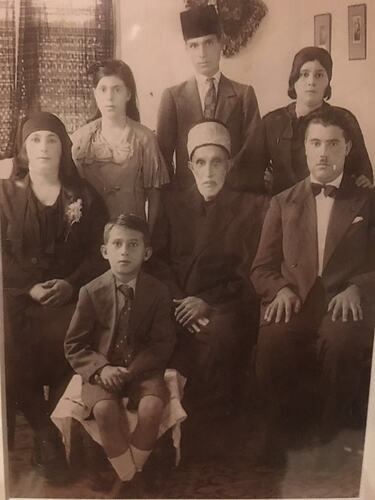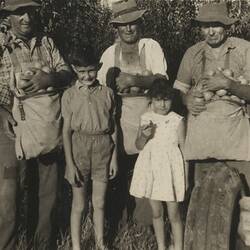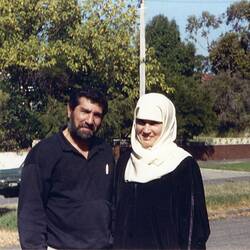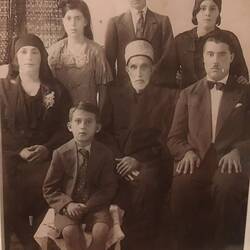Summary
Fehmi Naji El Imam migrated to Australia from Lebanon, aged 23, on the 'Hellenic Prince' in 1951.
Fehmi Naji El Imam, a 23 year old Lebanese Muslim, travelled on the ship the Hellenic Prince in 1951 to Australia. It was a long and hectic voyage. The same ship brought several more Muslims. When the ship sailed into Port Philip Bay, Fehmi recalls: 'I arrived into Melbourne itself, the South Melbourne side and the Richmond side. There were tall chimneys with the smoke going out on the top of the sky. And I said, oh my God, It was foggy that morning. And I said, is this London or Melbourne? I wasn't sure...There was nothing here for us at that time. There was no mosque, no centre, nor place where we can meet together, anything like that'. (ABC transcript)
When Fehmi arrived in Melbourne he worked as an electrician. One day while he was working electrical work, the Bosnian Muslims who heard that Fehmi had studied at medresa (Islamic school) in Tripoli, approached him and asked him to take on the role as an Imam; not only because of his Arabic language skills but also because of his knowledge of Islam. (Dzavid Haveric's interview with Ferid Muslimovic, 2017)
Fehmi's father was an Imam in Tripoli, but he was mainly a self-educated Islamic scholar, apart from his theoretical studies of Islamic sciences in Tripoli. 'Fehmi agreed to work as an imam on a voluntary basis. He didn't want to take payment or donations for himself rather he preferred that donations be given to the mosque. In the Carlton mosque a small community began its congregation each Friday led by Imam Fehmi.' (Dzavid Haveric's interview with Ferid Muslimovic, 2017) A Bosnian Muslim who also came to Australia in the 1950s recalled that 'Imam Fehmi was our father, educator and advisor.' (ibid)
For Fehmi it was both an inspirational and challenging life, evolving from a theology student in Lebanon to a religious leader in Australia. During the 1950s, Fehmi with other Muslim pioneers in Victoria began to collect donations, involving enormous effort from the community members. Fehmi went around and collected money from the people - 'pound after pound, 'penny after penny'. And we collected nearly a hundred thousand dollars but we felt that we would need some help from overseas. Fehmi also went to the USA, Europe and the Middle East searching for donations, with Saudi Arabia proving the most generous donor. (Dzavid Haveric's interview with Ramzy Elsayed)
In 1964 when their community operated in Carlton, Dr Abdul Khaliq Kazi, Ibrahim Dallal, Fehmi El Imam and Imam Ahmed Skaka, together with Muslim representatives from other states, founded the national body, the Australian Federation of Islamic Societies (AFIS) based in Melbourne. It was an important stage in the history of Islam in Australia. (AFIS Official Report, 1964) In the early 1970s, Sheikh Fehmi Imam was appointed as a full-time Imam with the Islamic Society of Victoria. (ABC transcript) The Sunday Islamic School was run by Sheik Fehmi. Sheikh Fehmi regularly attended AFIC youth camps held annually in summer in a different city each year since 1976, with the first camp in Sydney.
Sheikh Fehmi attended numerous interfaith meetings, building bridges with practitioners of other faiths. During his khutbah (speech during Friday congregation) at the Mosque, he highlighted the following: 'This is Islam, when you are showing something, you are doing something, and you are offering something. Everybody can sit in the corner of his home and pray day and night, but it is not good enough to do that if you don't really play your role in society and offer good things in society.' (ABC transcript)
Over a long period, Sheik Fehmi was the Head Imam of Preston Mosque and secretary of the Victorian Board of Imams. He became the Grand Mufti of Australia from June 2007 to September 2011 serving also as a board member on the Muslim Community Reference Group, an advisory board to the Government. (Victorian Interfaith Networks Conference Program Booklet, 2016) Sheik Fehmi, because of his Islamic and interfaith engagement, was the most venerated Imam in Australia of his time. He was able to present 'Australia to the Muslims and Muslims to Australia', remarked Professor Gary Bouma. 'He was a quiet worker, very highly respected within the Islamic community in Melbourne and Victoria', observed John Levi a Jewish Rabbi.
He was awarded an Order of Australia by the Australian Government for his services to multiculturalism, the Muslim community and multi-faith understanding. (ABC transcript)
Based on Dzavid Haveric's interview with Ehasan El-Helou, Ramzy Elsayed and interview with ABC.
More Information
-
Keywords
-
Authors
-
Article types



